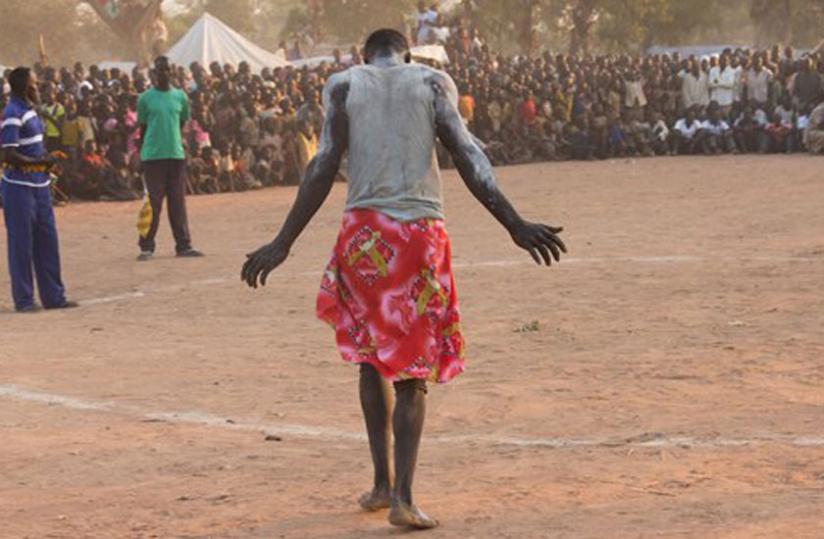HAJOOJ KUKA carried video equipment to the war-ravaged Nuba Mountains in the Blue Nile state of his native Sudan, a country that has suffered the world’s longest civil war. It was October of 2012.
Two years later, the documentary film he shot was one of 392 films screened at the Toronto International Film Festival. Recently, his film was voted the People’s Choice Award for a Documentary.
Before he started the project Kuka wanted to shoot a powerful documentary about the trials of the women, men and children who had suffered hunger and escaped certain death during yet another war on the southern border of his country.
When he finished filming, he found that he had recorded a very different story about how the people of Southern Kordufan – despite the aerial bombing by the government in Khartoum – can sing and dance their way out of these desperate times.
A pleasantly surprised Kuka later said, “Sudan eventually is going to become this great place, once we allow all these cultures to flourish and start celebrating them. And I really saw it in my film.”
A plane that does not drone
The Sudanese filmmaker named his film “Beats of the Antonov” as a play on words inspired by the sound of the Russian-made cargo planes that the Sudanese government uses to bomb villages in the Nuba Mountains of Blue Nile. Tens of thousands of civilians have been killed or displaced by a three-year war between rebels and the government.

Soldiers are part of it all. (Internet photo)
Kuka’s 65-minute documentary premiered early this month at the International Film Festival in Toronto, Canada. He hopes to show his film at other international festivals. The language of the people who appear in the film is Arabic, but Kuka is certain that their actions and their emotions articulate the narrative. He says they are the best promoters of “Beats of the Antonov.”
Watch a trailer for the documentary
The 36-year-old filmmaker from Khartoum has earned film credits for several other short films about Sudan and a longer documentary about the war in Darfur. That war erupted in 2003 when rebels accused the federal government of repression of the non-Arab population. The government response was the deaths of hundreds of thousands of civilians and the indictment of President Bashar al-Assad for genocide and war crimes against humanity by the International Criminal Court in the Hague.
That first long film was called “Darfur’s Skeleton.” It explored the plight of those who live in Darfur by letting them tell their narrative in their own voices.
Journey to the Nuba Mountains
Kuka decided for his new project to focus on the displaced in the high semi-arid mountains on the Sudan border. Before he arrived, he had decided the film would be a harrowing tale of people living under siege in Blue Nile and the Nuba Mountains.
Kuka was astonished by what he discovered in the camps of the displaced. They were singing and dancing and wrestling – an old athletic tradition among the Nuba – even as the Antonovs flew overhead. He realized the Nubans are making a statement about the endurance of their cultural identity – with a display of defiance – as African people who are being oppressed and dominated by an Arab Muslim government in Khartoum.
“The premise of the film is that the war in Sudan is mainly because of the identity issue,” Kuka said. He defines the differences as those imposed mainly by ruling Arab-Islamic people on a larger more diverse population.

Women and children have suffered most in this war. (Internet photo)
His short films – shot in different parts of Sudan – focus on music, resistance through non-violence and rights abuses. He hopes that his new film will provoke discussions in Sudan about the need to embrace cultural diversity.
The producer of Kuka’s latest documentary is Steven Markovitz, a South African who was captivated by a sophisticated and complex argument Kuka has developed in “Beats of the Antonov.”
A producer sees the point
The producer remembers their first meeting. “… I looked at some of the material and I immediately knew that A, there was really incredible talent and B, there was unique access to material that I had never seen before. I didn’t know anyone who had shot there before.”
After he saw the film, Markovitz said “… I, for the first time, have seen something where I fell back and was trying to get a handle on what’s going on in Sudan.”
Markovitz believes most Sudan war documentaries are manufactured by international media and foreign reporters who pay only brief visits to the country. As a producer of documentaries in other African countries, Markovitz calls “Beats of the Antonov” unique.
Written by : AGENCIES



